1. Early Life and Personal Background
Alberto Contador was born on 6 December 1982 in Pinto, within the Community of Madrid, as the third of four children. He grew up with an older brother, an older sister, and a younger brother who has cerebral palsy. Although he engaged in other sports during his childhood, such as football and athletics, Contador's elder brother, Francisco Javier, introduced him to cycling at the age of 14, sparking his passion for the sport.
1.1. Childhood and Education
At 15, Contador began competing in amateur cycling races in Spain, joining the Real Velo Club Portillo from Madrid. Despite not securing any victories in his first two years, his innate talent for climbing became evident, earning him the nickname "Pantani," after the famed Italian climber Marco Pantani. His dedication bore fruit in 2000 when he achieved his first victories, winning several mountains classification prizes in prominent Spanish amateur cycling events. He left school at 16, prior to completing his Bachillerato, to sign with Iberdrola-Loinaz, a youth team managed by Manolo Saiz, who was also the manager of the professional ONCE team.
1.2. Amateur Career
Contador quickly demonstrated his capabilities in the amateur ranks. In 2001, he secured a third-place finish in the Spanish National Time Trial Championships for the Under-23 category. The following year, in 2002, he further proved his strength against the clock by winning the Under-23 time trial title at the Spanish National Time Trial Championships. These early successes underscored his potential not just as a climber but as a versatile rider with strong time-trialing abilities.
1.3. Health Issues and Early Comeback
Contador's burgeoning career faced a life-threatening challenge on 12 May 2004, during the first stage of the 2004 Vuelta a Asturias. After approximately 25 mile (40 km) of racing, he suddenly felt unwell, fell from his bike, and experienced convulsions, having suffered from headaches for several days prior. He was diagnosed with a cerebral cavernoma, a congenital vascular disorder, necessitating risky brain surgery. Following the successful operation, which left a scar stretching from ear to ear across the top of his head, Contador underwent a rigorous recovery period. By the end of November 2004, he resumed training. A remarkable eight months after his surgery, he made a triumphant return to racing, winning the fifth stage of the 2005 Tour Down Under while riding for the Liberty Seguros team (formerly ONCE). He later described this victory as the greatest of his career, a testament to his resilience. That same year, he continued his strong comeback by winning the overall classification and a stage at the Setmana Catalana de Ciclisme, his first professional stage race victory. He also achieved a stage win in the 2005 Tour of the Basque Country, where he finished third overall, and a stage win in the 2005 Tour de Romandie, finishing fourth overall. In his debut 2005 Tour de France, he finished 31st overall and third in the young rider classification, showcasing his growing potential.
2. Professional Career
Alberto Contador's professional cycling career saw him compete for several prominent teams, achieving significant victories and facing major controversies.
2.1. ONCE-Eroski/Liberty Seguros (2003-2006)
Contador turned professional in 2003, joining the ONCE team. In his debut year, he secured his first professional victory by winning the eighth stage of the 2003 Tour de Pologne, an individual time trial. He strategically conserved energy during the morning's road stage, allowing him to deliver a winning effort in the afternoon time trial.

The 2006 season saw Contador continue his progression with stage wins at the 2006 Tour de Romandie, where he finished second overall, and the 2006 Tour de Suisse. However, his career was significantly disrupted before the start of the 2006 Tour de France. He and several teammates were implicated in the Operación Puerto doping case by Spanish authorities, leading to his team being barred from starting the race. While he was later cleared of all charges by the Union Cycliste Internationale (UCI), cycling's governing body, the incident cast a shadow. He returned to racing in the Vuelta a Burgos, but suffered another setback when he crashed after finishing fifth in stage 4, briefly losing consciousness. This was diagnosed as a lingering effect of his previous cavernoma, leading to his withdrawal from the upcoming Vuelta a España. The team ultimately disbanded at the end of 2006.
2.2. Discovery Channel (2007)
After the dissolution of his previous team and the lingering suspicions from Operación Puerto, Contador remained without a professional contract until mid-January 2007, when he finally signed with the Discovery Channel Pro Cycling Team. This proved to be a pivotal year in his career.
His first major professional victory with Discovery Channel came at 2007 Paris-Nice, where he clinched the overall title on the race's final stage. His team strategically wore down rivals, enabling Contador to launch a decisive attack on the final climb and hold off competitors.
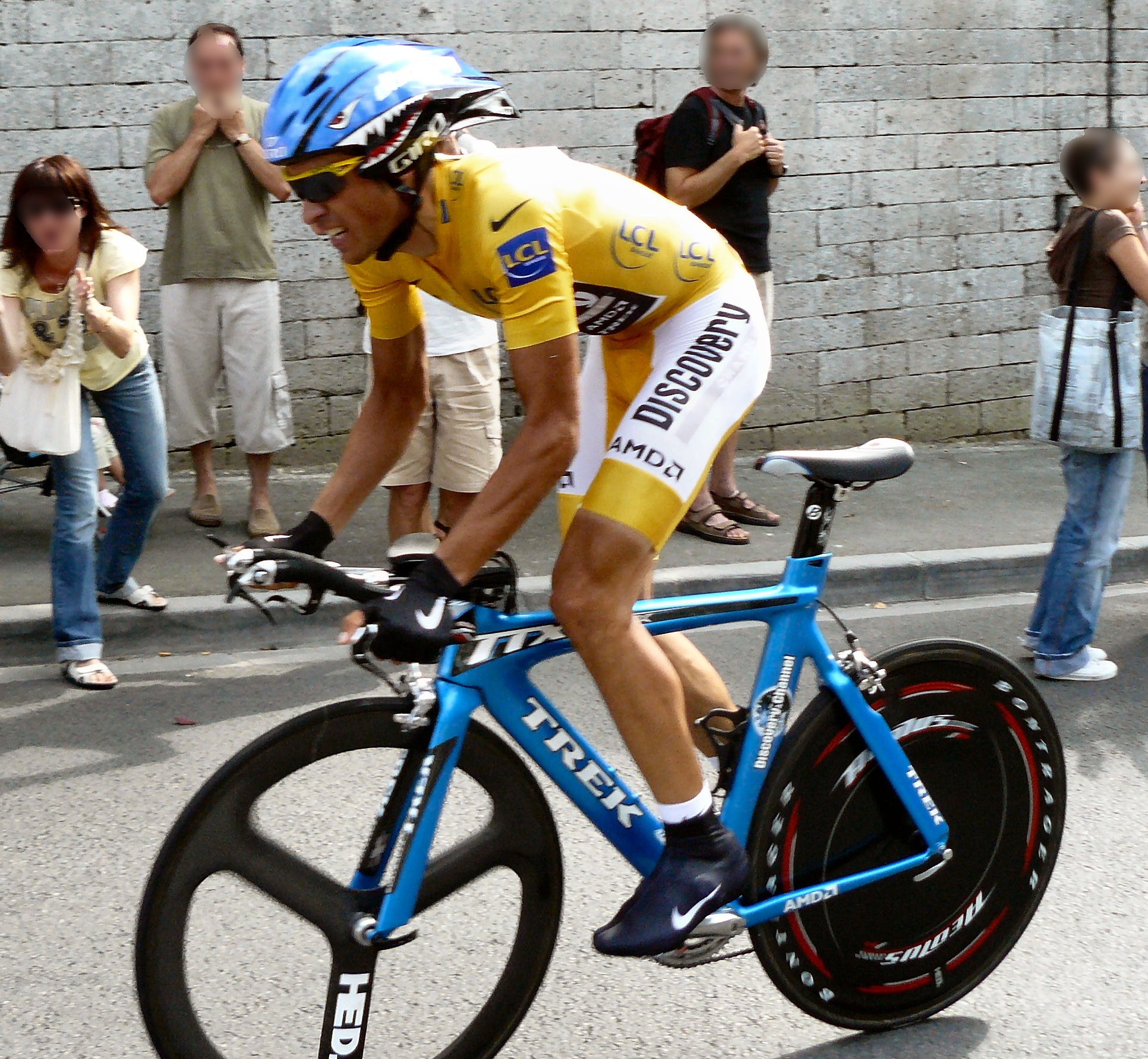
In the 2007 Tour de France, Contador demonstrated his climbing prowess by winning a stage with a mountaintop finish at Plateau de Beille. He climbed to second place in the general classification, trailing only Michael Rasmussen. However, Rasmussen was controversially removed from the race before Stage 17 for lying to his team about his pre-race training whereabouts, an incident that highlighted the sport's ongoing struggle with transparency and doping. Contador inherited the overall lead and the yellow jersey under these unusual circumstances. In the crucial Stage 19 individual time trial, he defied expectations by maintaining his lead, finishing only 23 seconds ahead of challenger Cadel Evans and 31 seconds ahead of teammate Levi Leipheimer. This narrow margin secured his first Tour de France victory, making it the closest top three finish in the race's history. He also won the young rider classification, becoming only the third cyclist to win both the overall and young rider classifications simultaneously.
2.3. Astana (2008-2010)
Following Discovery Channel's announcement that 2007 would be their final season in professional cycling, Contador transferred to the Astana team for the 2008 season.
2.3.1. 2008 Season: Grand Tour Dominance
The 2008 season began with a significant setback for Contador as the Amaury Sport Organisation (ASO), the organizer of the Tour de France, banned Astana from all their events due to the team's past doping history, despite changes in management and roster. This meant Contador was unable to defend his Paris-Nice and Tour de France titles. Despite this, he won his second Vuelta a Castilla y León and the 2008 Tour of the Basque Country, where he secured victory by winning the opening stage and the final individual time trial.

His participation in the 2008 Giro d'Italia was a last-minute decision; Astana received an invitation only a week before the race began, finding Contador on a beach in Spain. Despite the lack of specific preparation, he adapted quickly, finishing second in the first individual time trial and seizing the pink jersey after the demanding Stage 15 to Passo Fedaia. His consistent performance throughout the race, including riding with a fractured radius in his left arm after a crash, culminated in his first Giro d'Italia victory. He became the first non-Italian since 1996 and the second Spaniard to win the Giro, later stating this victory felt "bigger than if I'd had a second victory in the Tour de France" due to the circumstances.

At the 2008 Summer Olympics in Beijing, Contador competed in both the road race and the individual time trial. He did not finish the road race, which saw many withdrawals due to hot and humid conditions. In the individual time trial, he placed a strong fourth, just eight seconds behind his teammate Leipheimer.
Contador entered the 2008 Vuelta a España as the clear favorite, with fellow Spaniard Carlos Sastre (who had won the Tour de France a month earlier) as his main rival. He won Stage 13 with a decisive attack on the legendary Alto de l'Angliru, taking the golden jersey and the race lead. He further extended his advantage by winning Stage 14 to Fuentes de Invierno. Although Leipheimer won the final time trial by a significant margin, Contador maintained his lead, finishing 46 seconds ahead of Leipheimer and over four minutes ahead of Sastre in the overall standings. This historic victory made him the fifth cyclist, and the first Spaniard, to win all three Grand Tours. He achieved this "Grand Tour Triple Crown" in just 15 months, the shortest time among all riders, and also became only the third cyclist to win the Giro and Vuelta in the same year. Later that year, he received the prestigious Vélo d'Or award for the second consecutive season, recognizing him as the best rider of the year.
2.3.2. 2009 Season: Armstrong Rivalry and Second Tour Win
The 2009 season brought significant internal team challenges with the return of Lance Armstrong to professional cycling, joining Astana with the explicit goal of competing in the 2009 Tour de France. This created a contentious dynamic with Contador, who believed he deserved undisputed team leadership. While team manager Johan Bruyneel publicly stated he would hold Contador to his contract, he also acknowledged Contador as "currently the best professional cyclist in the world." Contador was eventually assured of his leadership position and decided to remain with Astana, though he later described the experience as "psychologically tough," likening it to competing in two races-one on the road and another within the team hotel, even requiring his brother to transport him after stages due to Armstrong's control of team vehicles. To focus on the Tour de France, Contador opted to skip the 2009 Giro d'Italia.

Contador began his season by winning the Volta ao Algarve overall, including a decisive individual time trial stage. In 2009 Paris-Nice, he won the prologue and a key mountain stage, taking the yellow jersey, but suffered a "hunger knock" in Stage 7, losing the lead and finishing fourth overall. He continued his Tour de France preparations at the 2009 Critérium du Dauphiné Libéré, finishing third overall. Before the Tour, he impressively won the Spanish National Time Trial Championships for the first time as a professional.
At the 2009 Tour de France, Contador won Stage 15 with a powerful solo attack on the summit finish to Verbier, gaining over a minute on most of his closest general classification rivals and taking the yellow jersey. He further extended his lead on Stage 17 and won the Stage 18 individual time trial, increasing his overall advantage to over four minutes. He ultimately won his second Tour de France by 4 minutes and 11 seconds over Andy Schleck, with Armstrong finishing third, 5 minutes and 24 seconds behind. During the podium celebration, Tour organizers mistakenly played the Danish national anthem instead of the Spanish Royal March, a notable gaffe. Following the Tour, a public war of words erupted between Contador and Armstrong, underscoring the deep personal animosity that had developed.
Contador's agent announced his desire to leave Astana despite his contract not expiring until the end of 2010, citing discomfort with the team's internal politics. However, the Kazakh sponsors of Astana insisted on enforcing his contract, ensuring his return for the 2010 season. His exceptional performance, including three stage wins and the overall victory at the Tour, also made him the inaugural winner of the 2009 UCI World Ranking.
2.3.3. 2010 Season: Controversial Third Tour Win
Contador started his 2010 season strongly, winning his second consecutive Volta ao Algarve and his second 2010 Paris-Nice with a decisive attack on the mountaintop finish to Mende. He also won his third Vuelta a Castilla y León and placed third in 2010 La Flèche Wallonne, showing his versatility beyond stage races.
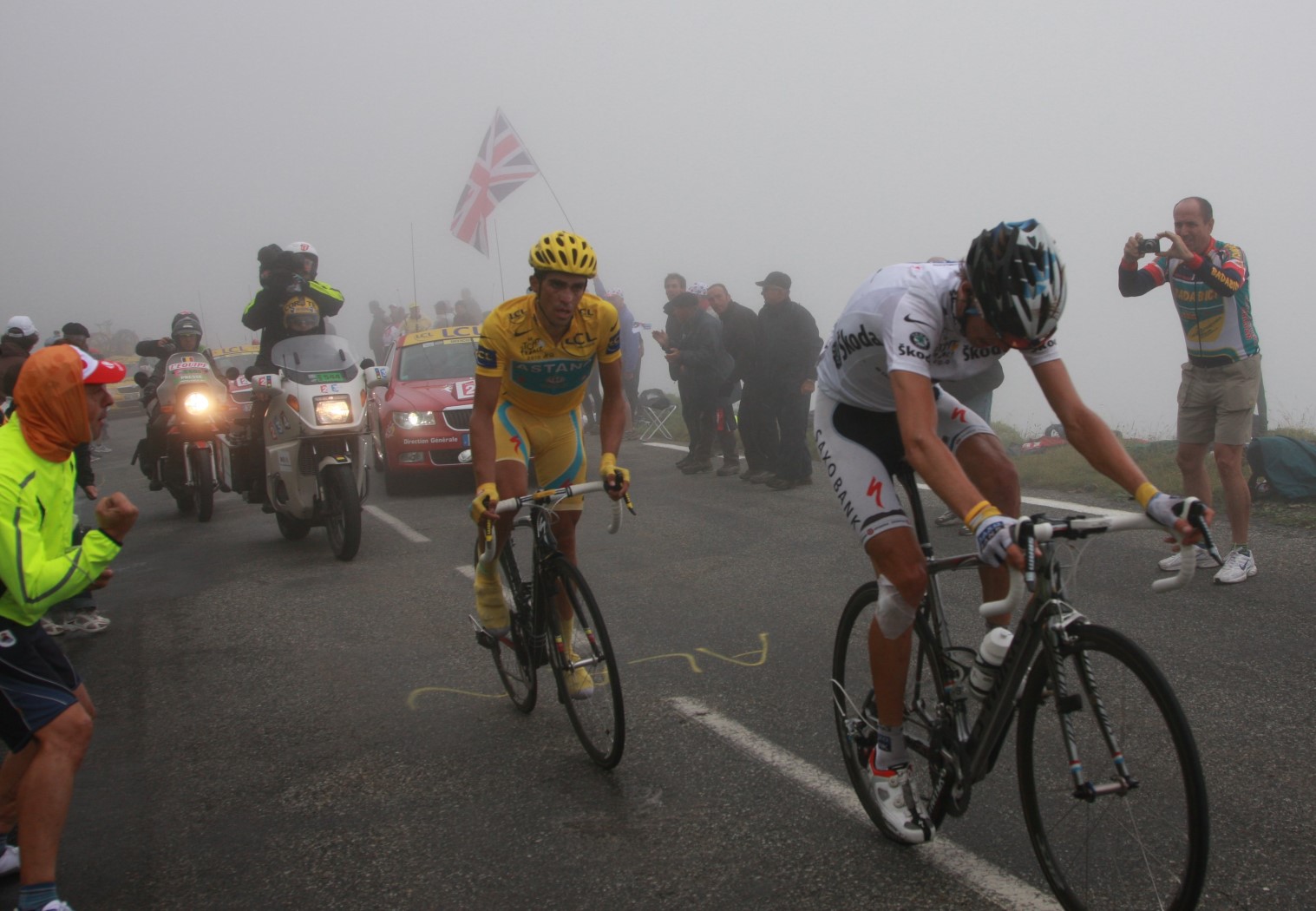
At the 2010 Tour de France, Contador was a primary favorite alongside Andy Schleck. A major controversy unfolded on Stage 15 when Schleck, who was leading the race, suffered a mechanical issue (his chain came off) while attacking on the final climb of Port de Balès. Contador, alongside Denis Menchov, immediately attacked, gaining a crucial 39 seconds on Schleck and taking the yellow jersey with a mere eight-second lead. This move was widely criticized as unsportsmanlike, even leading to whistles and catcalls on the podium. While some defended Contador by pointing to earlier instances where Schleck had not waited for Contador after a crash, Schleck publicly expressed his disappointment. Contador later issued an apology on his YouTube channel, acknowledging the contentious nature of his actions. Five days later, in the Stage 19 time trial, Contador again bested Schleck, gaining another 31 seconds. He went on to win the Tour de France for what was then considered his third time, with a 39-second advantage over Andy Schleck-the exact amount of time he had gained in the controversial Stage 15. However, this victory was later nullified due to his doping suspension.
Following the 2010 season, Contador signed a two-year contract with Saxo Bank-SunGard for the 2011 season, under team manager Bjarne Riis, who expressed an ambitious desire for Contador to attempt to win all three Grand Tours in a single season.
2.4. Saxo Bank-SunGard (2011-2016)
Contador's tenure with Saxo Bank was heavily influenced by the ongoing doping investigations and the subsequent ban, yet he continued to deliver remarkable performances.
2.4.1. 2011 Season: Giro Win and Tour Struggle (Later Voided)
Amidst the unresolved clenbuterol controversy, Contador began the 2011 season with victories at the Vuelta a Murcia (overall and two stages) and the 2011 Volta a Catalunya (overall and a stage). He also won a time trial stage at the Vuelta a Castilla y León.
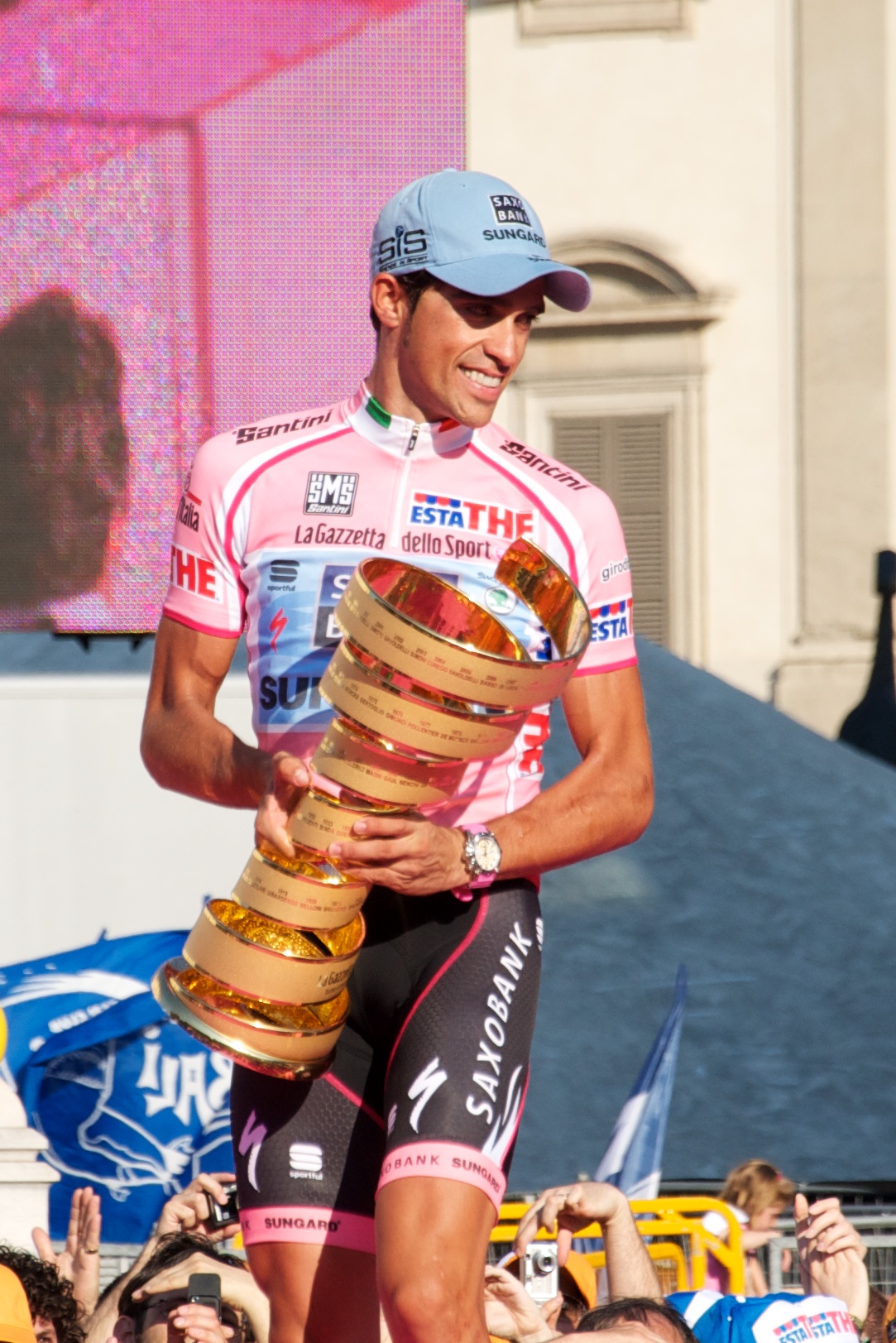
He then competed in the 2011 Giro d'Italia, his first appearance since his 2008 victory. Contador dominated the race, winning Stage 9 on Mount Etna with a strong attack that dropped his rivals. He extended his lead significantly, especially on the Grossglockner stage with José Rujano and the mountain time-trial to Nevegal. He ultimately won the race by over six minutes ahead of Michele Scarponi, also claiming the points classification and finishing second in the mountains classification. This marked his sixth consecutive Grand Tour victory, a truly exceptional feat.
Despite the pending hearing with the Court of Arbitration for Sport (CAS), Contador announced his intention to compete in the 2011 Tour de France, aiming to become the first rider since Marco Pantani in 1998 to win both the Giro and Tour in the same year. However, his Tour de France campaign was plagued by crashes in the opening days, injuring his right knee and losing significant time. Despite aggressive attacks in the Pyrenees and Alps, his efforts proved unsuccessful against rivals like Cadel Evans and Andy Schleck. He finished fifth overall, bringing an end to his winning streak in Grand Tours. Following the CAS ruling in February 2012, all his results from 25 January 2011, including his 2011 Giro d'Italia victory and his 2011 Tour de France fifth-place finish, were voided.
2.4.2. 2012 Season: Return from Suspension and Vuelta Victory
The 2012 season began with Contador awaiting the CAS verdict on his clenbuterol case. He initially placed second overall in the 2012 Tour de San Luis, winning two uphill finishes. However, on 6 February, the CAS announced its decision, finding him guilty of accidental ingestion of clenbuterol. This led to a two-year ban, retroactively applied from 25 January 2011, effective until 5 August 2012. Consequently, he was stripped of all results from that period, including his 2010 Tour de France and 2011 Giro d'Italia titles, and his contract with Saxo Bank was annulled.
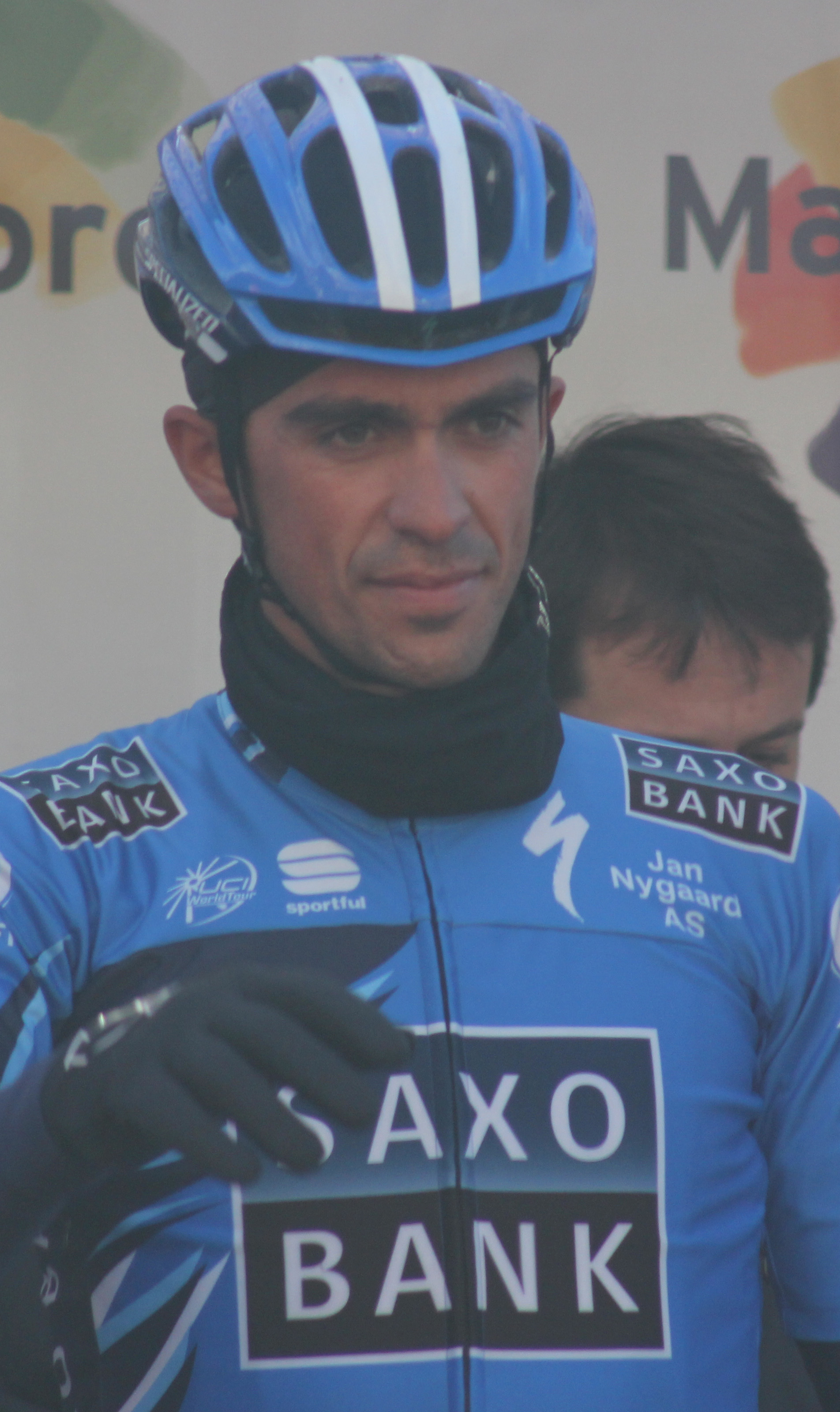
Upon the completion of his ban, Contador rejoined Saxo Bank on 8 June, signing a contract through the end of the 2015 season. His return to racing at the 2012 Eneco Tour saw him finish fourth overall, preparing for the 2012 Vuelta a España. As the team's leader at the Vuelta, Contador mounted numerous attacks in the mountains during the early stages, but race leader Joaquim Rodríguez consistently countered. However, in a stunning and unexpected move on Stage 17, Contador launched a solo attack from afar, eventually winning the stage and taking a significant lead from Rodríguez. He successfully defended his lead in the subsequent mountain stages, limiting his losses to rivals, and ultimately won his second Vuelta a España, marking a remarkable comeback victory after his suspension.
Later in 2012, Contador competed in the 2012 UCI Road World Championships in both the road race and the individual time trial, placing ninth in the latter. He also won the newly resurrected one-day classic 2012 Milano-Torino, dedicating his first one-day race victory to the memory of fellow cyclist Víctor Cabedo, who had recently died in a training accident.
2.4.3. 2013 Season: Challenges and Setbacks
The 2013 season proved to be a challenging one for Contador, with his only victory being a stage win at the 2013 Tour de San Luis in January. He finished third in 2013 Tirreno-Adriatico but fell ill during the race, disrupting his preparations for the rest of the season. He placed fifth overall in the 2013 Tour of the Basque Country and tenth in the 2013 Critérium du Dauphiné. In the 2013 Tour de France, he was unable to match the form of Chris Froome, finishing fourth overall. Following the Tour, his main sponsor, Oleg Tinkov, publicly criticized Contador's riding style. Despite this, Contador remained loyal to the team when Tinkov later acquired full ownership.
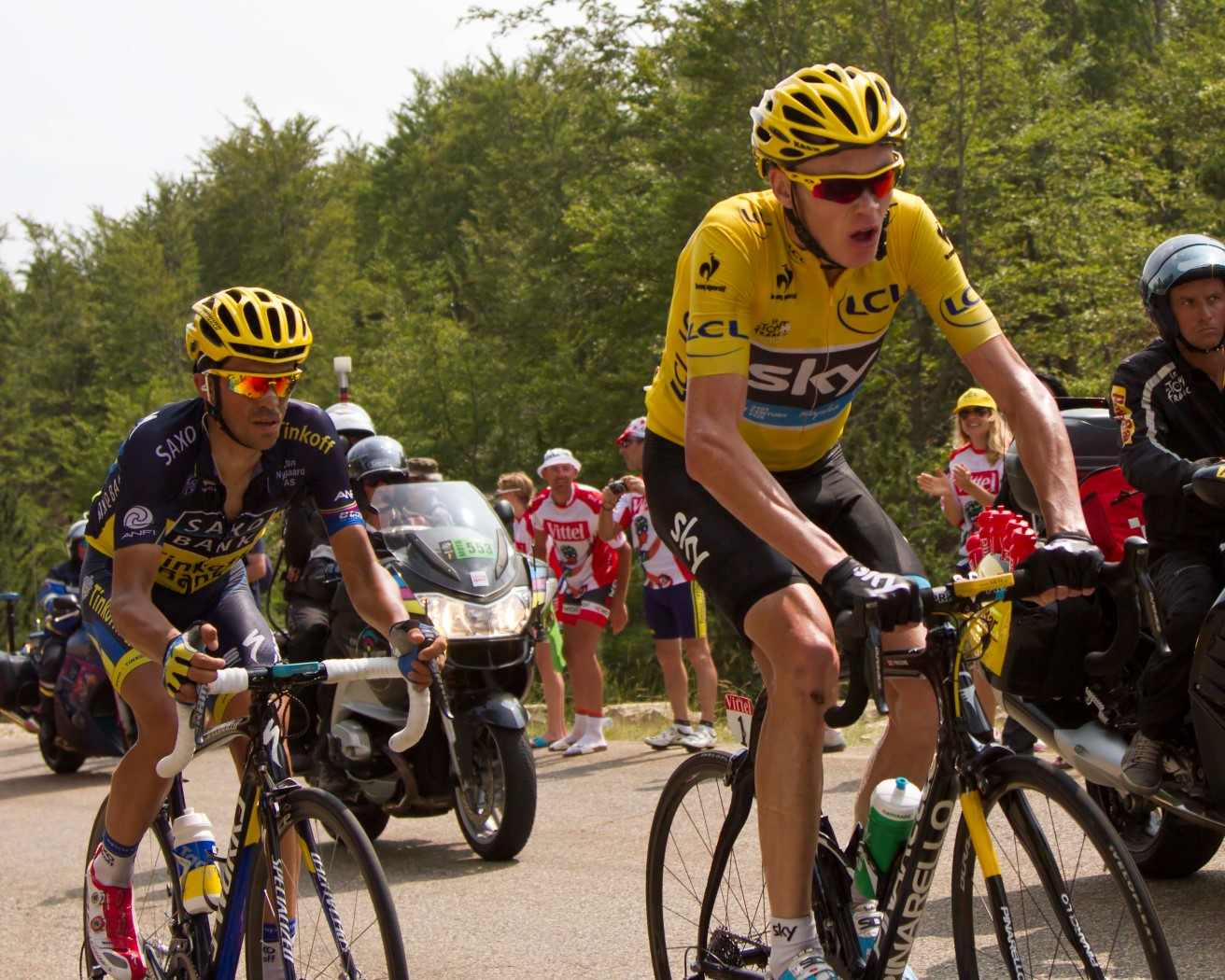
2.4.4. 2014 Season: Vuelta Comeback Victory
Aiming to regain his top form, Contador had a strong start to 2014. He finished second overall at the 2014 Volta ao Algarve, securing his first win of the season on Stage 4 with a solo attack on the Alto do Malhão. He then dominated 2014 Tirreno-Adriatico, winning two successive stages with impressive attacks and securing the overall title by over two minutes. He continued his strong form at the 2014 Volta a Catalunya, finishing second overall, just four seconds behind Joaquim Rodríguez.
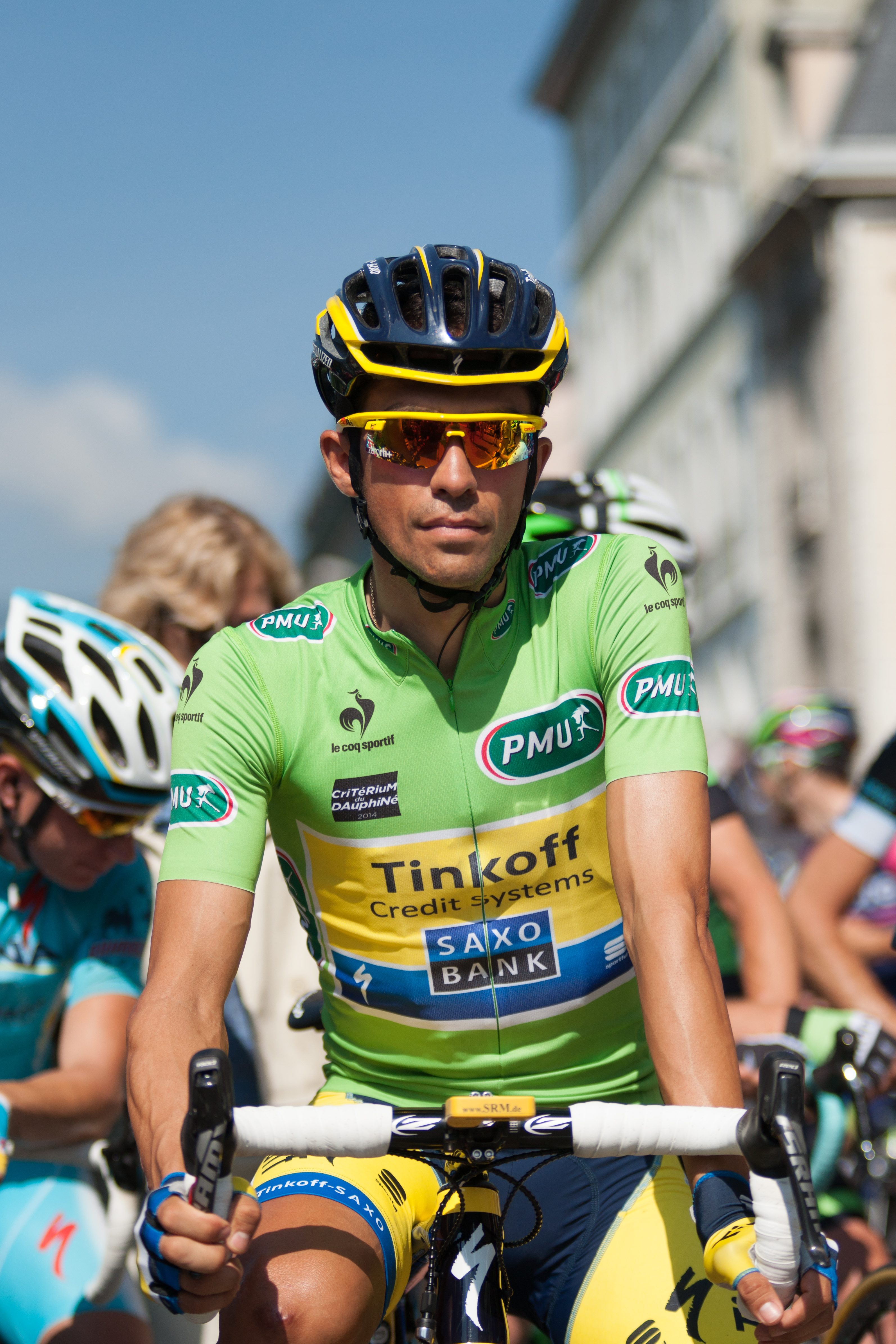
Contador then won the 2014 Tour of the Basque Country, taking the yellow jersey on Stage 1 with a decisive attack against Alejandro Valverde and holding the lead to the end. In his final preparation for the Tour de France, he battled fiercely with Froome and Vincenzo Nibali at the 2014 Critérium du Dauphiné. While he showed improved form against Froome, he ultimately lost the overall lead to Andrew Talansky in the penultimate stage, where he was isolated without teammates. However, he delivered a psychological blow to Froome, who struggled in the same stage.
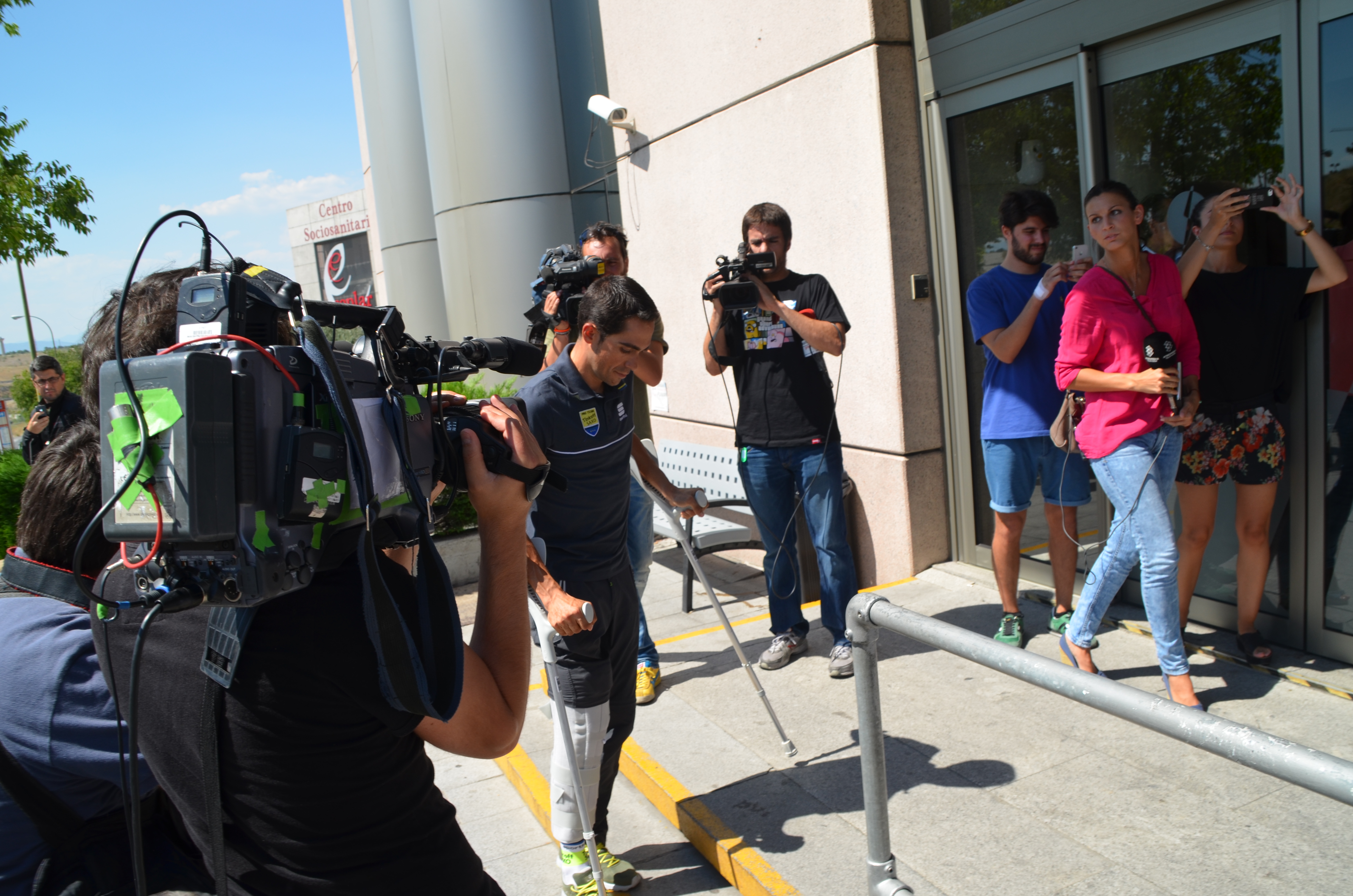
The 2014 Tour de France began well for Contador, as he avoided crashes in the first week. However, he lost significant time on the cobbled Stage 5 due to a mechanical issue. Tragically, on Stage 10, he crashed heavily on the descent of the Petit Ballon, sustaining a right tibial plateau fracture, which forced him to abandon the Tour. Although he initially ruled himself out of the 2014 Vuelta a España, he made a remarkable recovery and decided to start the race.
His Vuelta campaign was a testament to his fighting spirit. He performed well in the opening team time trial and consistently challenged his rivals in the mountains. He took the red jersey after the individual time trial on Stage 10. He further cemented his lead with commanding stage victories on the queen stage to La Farrapona and the penultimate stage to Puerto de Ancares, where he out-battled Froome. Despite riding conservatively in the final time trial due to wet conditions, he secured his third Vuelta a España overall victory. Following this win, he opted to skip the UCI Road World Championships to prepare for the 2015 season.
2.4.5. 2015 Season: Giro-Tour Double Attempt
For 2015, Contador declared his ambitious goal of winning both the 2015 Giro d'Italia and the 2015 Tour de France in the same year, a rare "double" last achieved by Marco Pantani in 1998. He started his season at the 2015 Vuelta a Andalucía, finishing second overall to Chris Froome, and won Stage 3 with a decisive attack. He also placed fifth overall at 2015 Tirreno-Adriatico and fourth at the 2015 Volta a Catalunya, despite a severe crash in the penultimate stage that caused a micro-fissure in his sacrum.
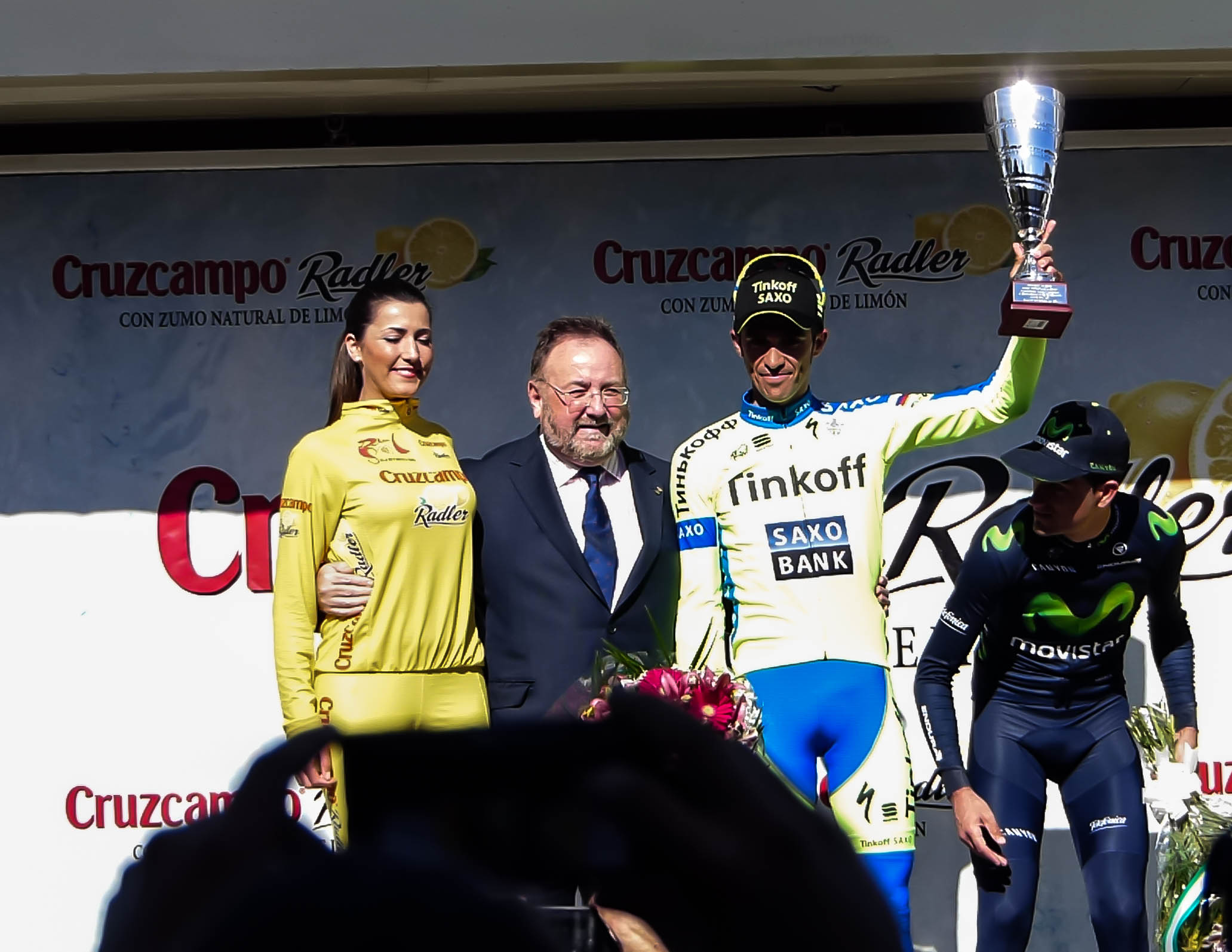
At the 2015 Giro d'Italia, his Tinkoff-Saxo team performed strongly in the opening team time trial. Contador took the maglia rosa on the summit finish of Stage 5. However, he dislocated his shoulder in a crash on the following day's finish, and re-dislocated it before the podium presentation, though he continued to race. He temporarily lost the pink jersey on Stage 13 due to a crash within the final 2.0 mile (3.2 km) of the stage, but dramatically regained it the next day with a dominant performance in the 37 mile (59.3 km) individual time trial, establishing a significant lead. Despite losing some time to Fabio Aru and Mikel Landa in the final mountain stages, Contador sealed his second official Giro title by 1:53 over Aru, joining Bernard Hinault as the only cyclists with multiple victories in each Grand Tour.
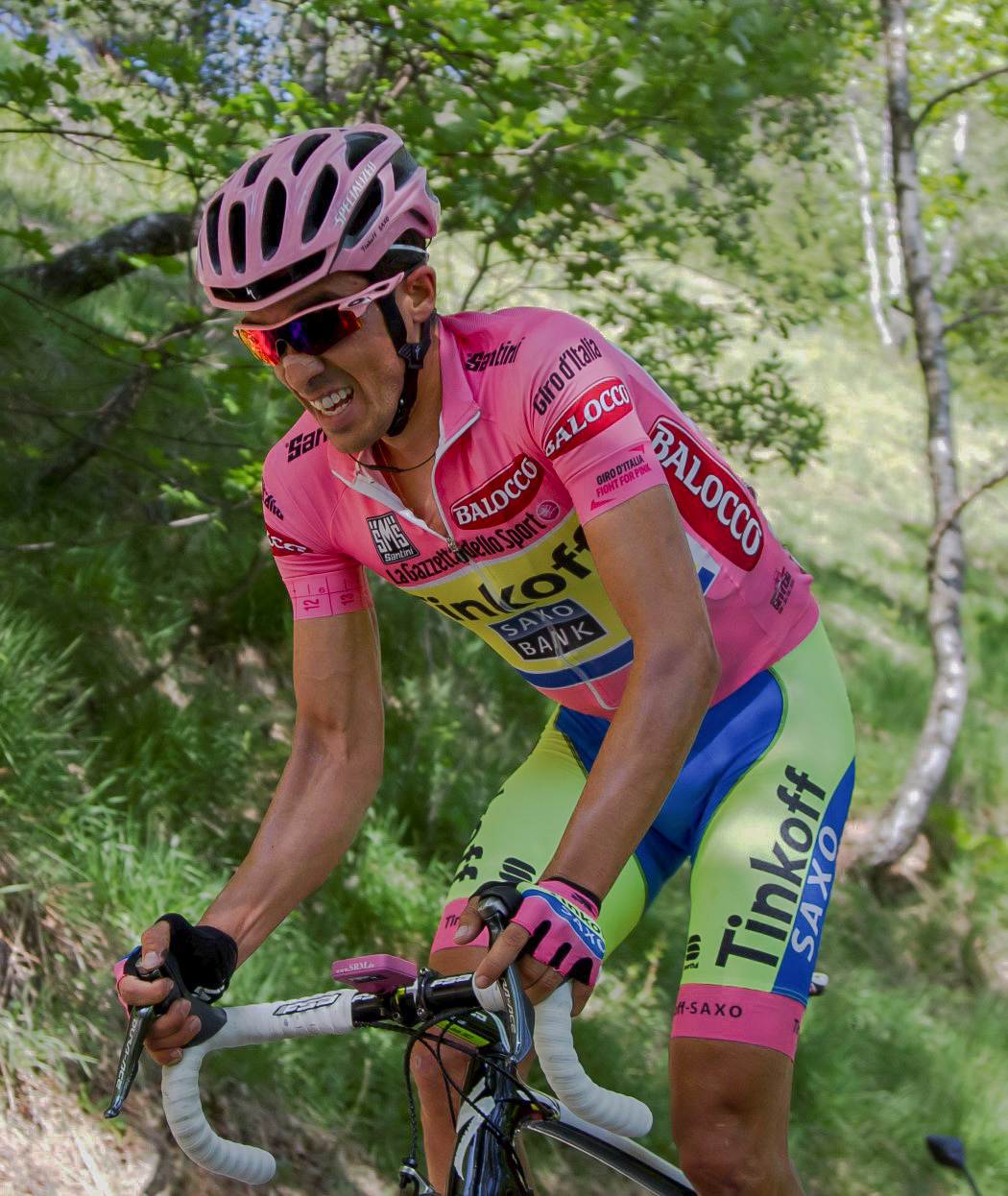
In preparation for the Tour, he won the Route du Sud, besting Tour rival Nairo Quintana on the queen stage. However, the Giro's exertions took their toll in the 2015 Tour de France. While he gained time on some rivals in the first week, he struggled on the opening summit finishes, losing significant time to Chris Froome. A crash on Stage 17 further hampered his efforts, and he was unable to match his competitors on the final mountain stages. Contador finished fifth overall, 9 minutes and 48 seconds behind winner Froome, failing to achieve the Giro-Tour double. Despite the outcome, he expressed no regrets, stating he preferred to have tried and learned it was "really complicated because nobody has the experience on how to prepare it." His season ended early due to sickness, forcing him to withdraw from the 2015 Clásica de San Sebastián.
2.4.6. 2016 Season: Final Career Years with Saxo Bank
In March 2015, Contador signed a contract extension with Tinkoff (formerly Saxo Bank), simultaneously announcing that 2016 would be his final season in professional cycling. He started 2016 strong, finishing third overall and winning the final stage of the 2016 Volta ao Algarve. He then secured runner-up finishes at 2016 Paris-Nice, where he launched a brave long-range attack against Geraint Thomas, and the 2016 Volta a Catalunya. He capped off his strong spring by winning the general classification and a time trial stage at the 2016 Tour of the Basque Country. Following these impressive performances, he stated he would postpone his retirement for at least another year.
Contador's 2016 Tour de France campaign was marred by crashes in the opening stages, causing him to lose time and leaving him with injuries. He ultimately withdrew from the race on Stage 9, citing a fever. In August, he won the overall classification of the 2016 Vuelta a Burgos. He went on to finish fourth at the 2016 Vuelta a España, where he earned the combativity award for his aggressive racing, notably a decisive attack on Stage 15 that propelled him up the general classification.
2.5. Trek-Segafredo (2017)
Contador joined Trek-Segafredo for the 2017 season, which he had declared would be his final year as a professional cyclist. He was joined by long-time teammate Jesús Hernández and directeur sportif Steven de Jongh.
2.5.1. Final Professional Season and Retirement
Contador started his final professional season with strong performances, finishing second overall at the 2017 Vuelta a Andalucía, just one second behind Alejandro Valverde of Movistar Team. In March, he narrowly missed out on victory at 2017 Paris-Nice for the second consecutive year, finishing second by only two seconds after a final-day attack was reeled in by Sergio Henao of Team Sky. He also secured second place overall at the 2017 Volta a Catalunya and the 2017 Tour of the Basque Country, both behind Valverde.
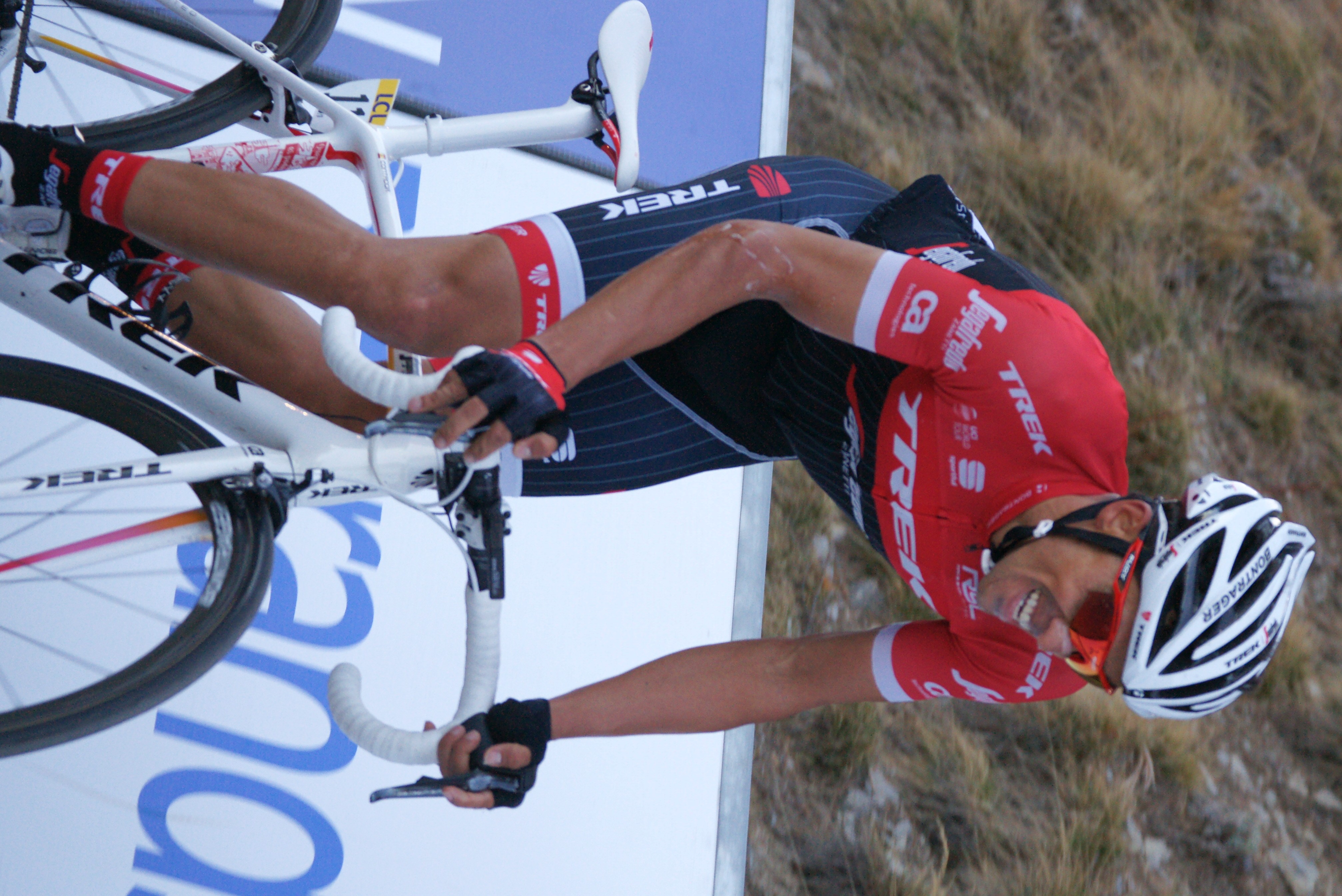
In July, Contador rode the 2017 Tour de France for the last time. Although he was unable to challenge for the overall victory, finishing ninth, he showcased his characteristic aggressive style, earning two combativity awards for his attacks on Stages 13 and 17, notably on the Mûr-de-Péguère and Col du Galibier.
Contador's final professional race was the 2017 Vuelta a España. He rode an aggressive race in pursuit of a stage victory, despite losing time early on that ultimately cost him a podium finish. His fighting spirit culminated in a dramatic stage victory on the iconic mountaintop finish of the Alto de l'Angliru on Stage 20, his last major win. He attacked on the penultimate climb and held off a strong chase by Chris Froome and Wout Poels, crossing the line with his signature "El Pistolero" celebration. He finished fifth overall and was awarded the overall combativity award for his relentless attacking throughout the race. He made his final public appearance at the Japan Cup criterium on 21 October 2017, where he again delighted fans with his active riding and "El Pistolero" pose.
3. Doping Controversies
Alberto Contador's career was significantly overshadowed by a series of doping allegations and cases, which raised persistent ethical questions about his achievements and the integrity of professional cycling.
3.1. Operación Puerto
In 2006, prior to the start of the 2006 Tour de France, Contador and five other members of his Liberty Seguros team were barred from competing due to alleged connections with the Operación Puerto doping case, a major blood doping investigation in Spain. While Contador and four teammates were eventually cleared of all charges by the Spanish courts on 26 July 2006, and later by the UCI, suspicions lingered.
Documents from the investigation, notably "Documento 31," reportedly linked the initials "A.C." to a note "Nada o igual a J.J.Nothing or the same as J.J.Spanish", referring to Jörg Jaksche, who later admitted to blood doping with Eufemiano Fuentes. Contador denied knowing Fuentes personally when questioned by the magistrate in December 2006 and, according to French daily Le Monde, he refused a DNA test that could have linked him to blood bags found in the investigation. Le Monde further reported in July 2007 that Contador's name appeared in several Puerto documents, though direct links to doping practices were not definitively established. German doping expert Werner Franke publicly accused Contador of past drug use and being prescribed a doping regimen by Fuentes, allegations Contador vehemently denied, stating he was "in the wrong team at the wrong time." Despite his clearance, the Operación Puerto saga contributed to an enduring cloud of suspicion over his early career.
3.2. 2010 Tour de France Clenbuterol Case
The most significant doping controversy of Contador's career emerged in September 2010, when he revealed that a urine sample taken on 21 July, a rest day during the 2010 Tour de France, had tested positive for trace amounts of clenbuterol.
3.2.1. Initial Positive Test and Defense
Contador immediately held a press conference on 30 September, asserting his innocence and claiming the positive test was due to food contamination, specifically contaminated meat. He highlighted the extremely minute concentration of clenbuterol detected-50 pg/mL, which was initially reported as 400 times (and later clarified as 40 times) below the minimum detection standards required by the WADA. He positioned himself as a victim, arguing that such a tiny amount could not have provided any performance benefit and that no athlete would intentionally use such an easily detectable substance. However, this explanation faced skepticism, as official data showed very few clenbuterol positives in animal samples tested in the EU and Spain during 2008 and 2009. Further, a pre-positive sample from Contador was reported to contain plastic residue (plasticizers), sometimes associated with blood bags used in doping, though this finding was not recognized by WADA for charges. A theory circulated that if clenbuterol was introduced through a transfusion of blood taken when he had used it earlier to strip fat, it could explain the minute traces without implying recent intentional ingestion.
3.2.2. Investigation and Appeals
The UCI initially stated that the minute concentration required further scientific investigation and provisionally suspended Contador, though this had no immediate impact as his 2010 season was already concluded. In late January 2011, the Royal Spanish Cycling Federation (RFEC) initially proposed a one-year ban and the stripping of his 2010 Tour title. However, amidst public support from figures including the Spanish Prime Minister, the RFEC later accepted Contador's appeal and cleared him of all charges in February 2011.
Both the UCI and WADA independently appealed the RFEC's decision to the Court of Arbitration for Sport (CAS) in March 2011. The CAS hearing was subjected to multiple postponements throughout 2011, shifting from June to August, and then to November, generating significant frustration within the cycling community. During this period, Contador was permitted to continue racing, raising ethical concerns about competing under a doping cloud.
3.2.3. Final CAS Verdict and Stripped Titles
The definitive CAS ruling was finally delivered on 6 February 2012. The court found Contador guilty of an anti-doping rule violation, though it categorized the ingestion of clenbuterol as "accidental," acknowledging that the substance may have come from a contaminated supplement, but that Contador failed to prove it was through an involuntary, accidental ingestion. This crucial distinction meant he did not meet the conditions for a reduction or annulment of the sanction.
As a result, Contador was handed a two-year ban, backdated to 25 January 2011. More significantly, he was stripped of his 2010 Tour de France title (which was subsequently awarded to Andy Schleck) and his 2011 Giro d'Italia victory (awarded to Michele Scarponi), along with all other results achieved during his suspension period. The CAS also ordered him to pay a fine of 2.48 M EUR. The following day, his contract with Saxo Bank was officially annulled.
3.2.4. Aftermath and Impact
The CAS verdict had immediate and profound consequences for Contador's career. He lost two of his Grand Tour titles, severely impacting his historical record and public image. The annulment of his team contract further underscored the severity of the ruling. This high-profile case intensified the ethical debate within professional cycling regarding doping control, food contamination, and athlete responsibility. While Contador maintained his innocence and continued to assert he was a victim of a flawed system, the ruling cemented a controversial chapter in his career, leaving a complex legacy that intertwines extraordinary talent with persistent ethical challenges in the sport.
4. Riding Style and Characteristics
Alberto Contador was renowned for his distinctive and aggressive riding style, particularly effective in stage races. At 5.8 ft (1.76 m) tall and weighing 137 lb (62 kg), his physique contributed to his climbing prowess.
4.1. Strengths as a Climber and Time-Trialist
Contador's primary strength lay in his powerful attacking prowess on mountain climbs. He possessed an uncanny ability to launch sudden, decisive accelerations on steep gradients, often dropping his rivals with a single, sharp burst of speed, a tactic he famously employed to devastating effect in Grand Tours like the 2008 Vuelta a España. His climbing skills earned him the nickname "Pantani" early in his career, and he lived up to it by winning stages on iconic mountain finishes such as the Alto de l'Angliru, Plateau de Beille, and Mount Etna.
While initially more recognized as a climber, Contador significantly improved his individual time trial capabilities throughout his career. This evolution transformed him into a truly versatile contender, capable of both gaining time in the mountains and defending or extending leads against the clock. His ability to perform strongly in time trials, often challenging specialized time-trialists, made him a formidable all-rounder in multi-day races.
4.2. All-Rounder Capabilities
Contador's tactical intelligence and consistent performance across varied terrains underscored his capabilities as an all-rounder. He was known for his astute race craft, often making unpredictable moves that turned races to his favor, such as his audacious attack on Stage 17 of the 2012 Vuelta a España that seized the overall lead. This combination of climbing, time-trialing, and tactical acumen made him a consistent threat for overall victories in Grand Tours, allowing him to adapt and excel regardless of the course profile.
4.3. "El Pistolero" Celebration
Contador was also distinctively recognized for his signature victory salute, the "El Pistolero" (the pistolero), where he would mimic firing a pistol with his hand after crossing the finish line. This celebration became synonymous with his aggressive, winning style and was widely recognized by fans, further cementing his iconic status in the sport. He often delighted fans by performing this pose, even wearing a cap featuring the gesture during podium ceremonies.
5. Post-Retirement Activities
Since retiring from professional cycling, Alberto Contador has remained actively involved in the sport through various ventures.
5.1. Business Ventures: Aurum Bikes
In 2020, Contador co-founded a high-end bicycle brand named 'Aurum Bikes' with his former teammate and close friend Ivan Basso. The name "Aurum" is Latin for "gold," reflecting their pursuit of excellence. The brand aims to produce performance bicycles rooted in their combined professional racing experience.
5.2. Team Management and Commentary
Contador also transitioned into team management, co-founding a UCI Continental team with Ivan Basso, initially known as Polartec-Kometa. This team later became Eolo-Kometa in 2021, and it has adopted Aurum Bikes as its official bicycle sponsor. His involvement demonstrates a commitment to nurturing new talent in the sport. Additionally, since 2018, Contador has lent his expertise and insights to television broadcasting, joining Eurosport as a cycling commentator, providing analysis for major races and maintaining his presence in the public eye. He even participated in the "Digital Japan Cup," an online alternative to the Japan Cup in 2020, showcasing his continued engagement.
6. Major Achievements and Awards
Alberto Contador's career is marked by an impressive list of victories and accolades, firmly establishing him as one of cycling's greats, despite the controversies.
6.1. Grand Tour General Classification Victories
Contador is one of only seven cyclists in history to have won all three Grand Tours (the Tour de France, Giro d'Italia, and Vuelta a España). He is also one of only two riders to have won all three Grand Tours more than once. His official victories include:
- 2007 Tour de France
- 2008 Giro d'Italia
- 2008 Vuelta a España
- 2009 Tour de France
- 2012 Vuelta a España
- 2014 Vuelta a España
- 2015 Giro d'Italia
His victory in the 2008 Vuelta a España made him the fifth cyclist at that point to complete the career Grand Tour Triple Crown, achieving the feat in a record-short 15 months, and notably, the first Spaniard to do so. He also became only the third cyclist to win the Giro d'Italia and the Vuelta a España in the same year (1973: Eddy Merckx; 1981: Giovanni Battaglin).
Below is a timeline of his Grand Tour general classification results:
| Grand Tour General Classification Results | |||||||||||||
| Grand Tour | 2005 | 2006 | 2007 | 2008 | 2009 | 2010 | 2011 | 2012 | 2013 | 2014 | 2015 | 2016 | 2017 |
|---|---|---|---|---|---|---|---|---|---|---|---|---|---|
Giro d'Italia | - | - | - | 1 | - | - | DSQ | - | - | - | 1 | - | - |
Tour de France | 31 | - | 1 | - | 1 | DSQ | DSQ | - | 4 | DNF | 5 | DNF | 9 |
Vuelta a España | - | - | - | 1 | - | - | - | 1 | - | 1 | - | 4 | 5 |
| Legend | |||||||||||||
| - | Did not compete | ||||||||||||
| DNF | Did not finish | ||||||||||||
| DSQ | Disqualified / Voided result | ||||||||||||
6.2. Other Major Stage Race Victories
Beyond his Grand Tour triumphs, Contador achieved numerous overall victories and significant podium finishes in other prestigious stage races:
- 2005 Setmana Catalana de Ciclisme (Overall, Stage 3, Combination classification)
- 2007 Paris-Nice (Overall, Young rider classification, Stages 4 & 7)
- 2007 Vuelta a Castilla y León (Overall, Combination classification, Spanish rider classification, Stage 4)
- 2008 Tour of the Basque Country (Overall, Stages 1 & 6)
- 2008 Vuelta a Castilla y León (Overall, Combination classification, Spanish rider classification, Stages 1 & 4)
- 2009 Volta ao Algarve (Overall, Stage 4)
- 2009 Tour of the Basque Country (Overall, Stages 3 & 6)
- 2010 Volta ao Algarve (Overall, Stage 3)
- 2010 Paris-Nice (Overall, Stage 4)
- 2010 Vuelta a Castilla y León (Overall, Combination classification, Spanish rider classification, Stage 4)
- 2012 Milano-Torino (One-day race)
- 2014 Tirreno-Adriatico (Overall, Stages 4 & 5)
- 2014 Tour of the Basque Country (Overall, Stage 1)
- Route du Sud (Overall, Stage 3)
- 2016 Tour of the Basque Country (Overall, Stage 6)
- 2016 Vuelta a Burgos (Overall)
6.3. Individual Awards
Contador's individual prowess was recognized with several prestigious awards:
- Vélo d'Or: 2007, 2008, 2009, 2014. This award acknowledges the best cyclist of the year, as voted by international cycling journalists.
- Combativity award in the Tour de France: 2017 (Stages 13 & 17).
- Combativity award in the Vuelta a España: 2012, 2016 (Stage 15 & Overall), 2017 (Overall).
7. Legacy and Evaluation
Alberto Contador's legacy in professional cycling is multifaceted, defined by both his extraordinary athletic talent and the significant ethical questions that arose during his career.
7.1. Positive Contributions and Impact
Contador's undeniable talent and aggressive racing style captivated fans worldwide. His ability to launch explosive attacks on steep climbs, combined with his improved time-trialing, made him a thrilling and versatile Grand Tour contender. He consistently pushed the pace, delivering memorable performances that ignited races and provided compelling spectacles for audiences. His resilience, particularly his triumphant return to the sport after undergoing life-threatening brain surgery, served as a powerful inspiration. Moreover, his achievement of the "Grand Tour Triple Crown" in such a short span of time solidified his place in cycling history as one of the sport's greatest stage racers. His signature "El Pistolero" celebration became an iconic symbol of his fighting spirit and panache.
7.2. Criticisms and Controversies
Despite his exceptional achievements, Contador's legacy is undeniably complicated by the doping controversies that punctuated his career. His implication in the Operación Puerto doping case and, more prominently, the positive test for clenbuterol during the 2010 Tour de France, cast a long shadow over his accomplishments. The stripping of his 2010 Tour de France and 2011 Giro d'Italia titles, despite his claims of food contamination and the CAS's finding of "accidental ingestion," significantly impacted his official record and public perception. These incidents fueled broader ethical discussions within professional cycling about anti-doping protocols, the burden of proof on athletes, and the sport's persistent battle for credibility.
Furthermore, his controversial attack on Andy Schleck during the 2010 Tour de France after Schleck suffered a mechanical issue, an act widely criticized as unsportsmanlike, added to the moral scrutiny of his racing tactics. Ultimately, Contador's career serves as a poignant reminder of the tension between athletic brilliance and the imperative for ethical conduct in elite sports, leaving a legacy that is both celebrated for its triumphs and scrutinized for its ethical complexities.


